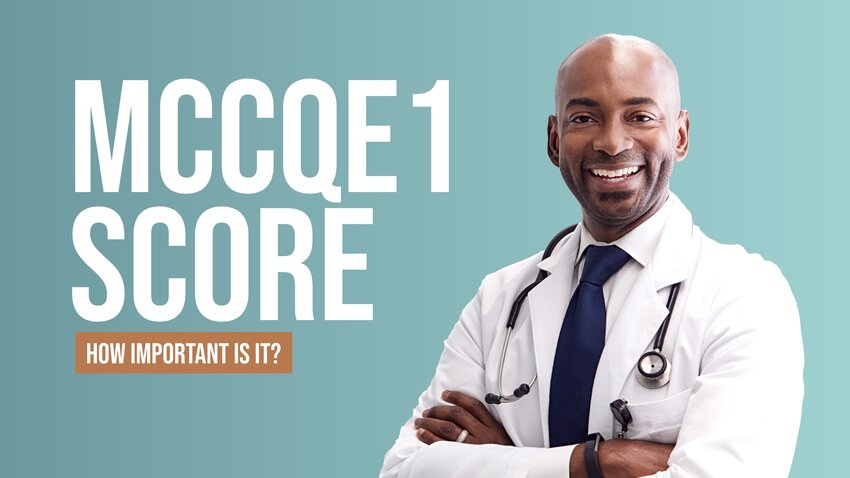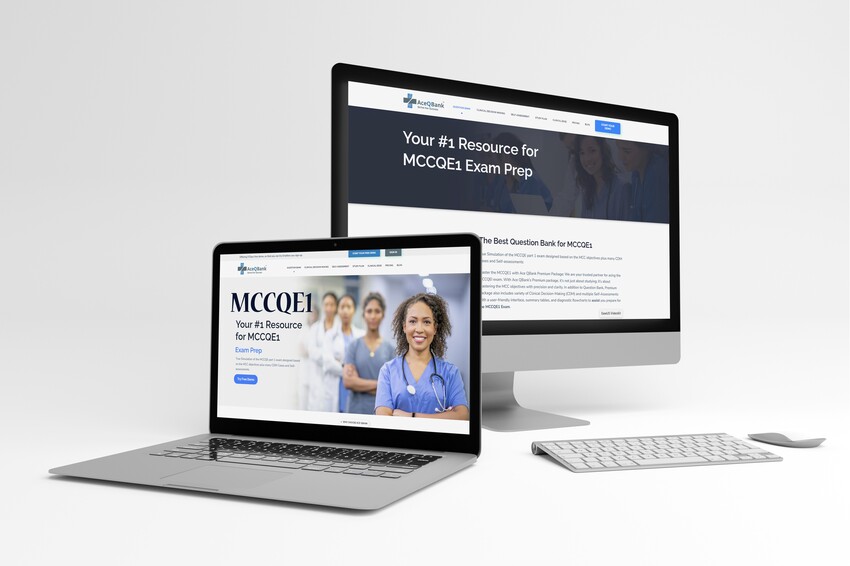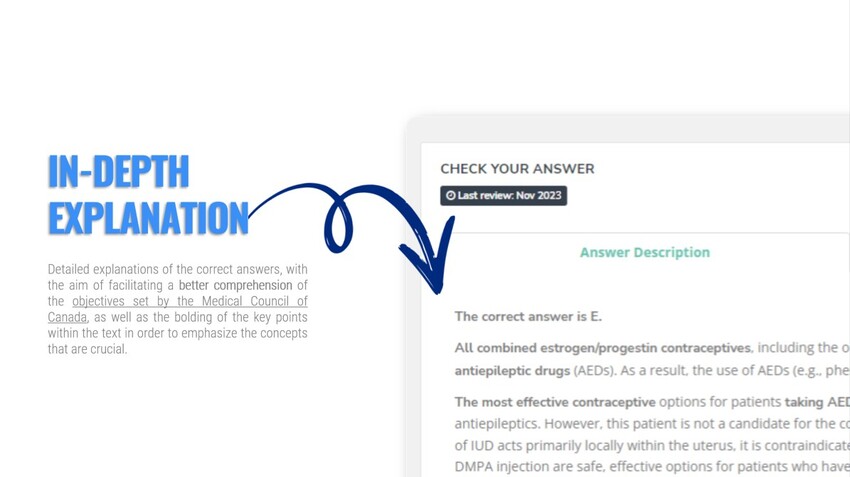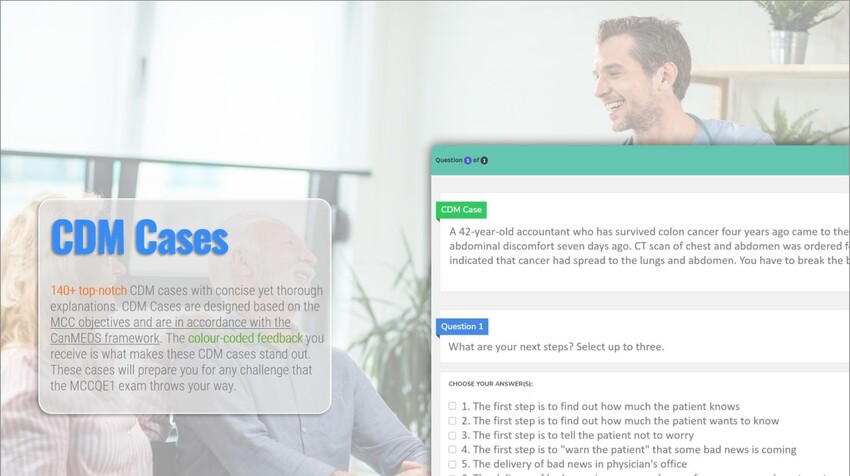How To Achieve A High MCCQE1 Passing Score?

The Canadian qualification exam known as the Medical Council of Canada Qualifying Examination (MCCQE) part 1 holds importance, for physicians who want to practice medicine in Canada. Therefore, the MCCQE1 passing score is not a benchmark; it serves as a pathway to medical practice in the country.
Considering the exams standards aspirants often discuss the significance of achieving a high score. What does it take to not pass but excel at MCCQE1 and how does this accomplishment impact a physicians future? But how crucial is it to obtain a high score on the MCCQE1? For those aiming to apply through CaRMS it is a important factor. Your earned score can reflect your knowledge and clinical expertise distinguishing you from other candidates.
In this blog post we will delve into the passing score for the MCCQE1 and explain why striving for more, than the requirement is worth your dedication. Additionally we will equip you with strategies designed to boost your score. Whether you’re embarking on this journey after graduating from school or you’re an experienced physician navigating the licensure process, in Canada. This article will shed light on how to achieve a high score in MCCQE1.
Understanding the MCCQE1 Passing Score
Studying for the Canadian qualification exam. Is challenging, it tests you on a wide range of medical knowledge and skills. Passing the MCCQE1 means that you properly understand and use medical information to take care of virtual patients. It’s a hard test, but it’s an important step in becoming a doctor in Canada. so, it’s essential to grasp the scoring system for this exam as it holds the key, to your future in medicine. Let’s go on this journey together exploring what could be the crucial milestone, in your medical career.
First thing first. In MCCQE1, there are two main parts:
- Multiple-Choice Questions (MCQ): This section consists of about 210 questions. It evaluates your medical knowledge and how well you understand the objectives set by the Medical Council of Canada (MCC).
- Clinical Decision-Making (CDM) Cases: Here, you will encounter around 38 real-world scenarios. The purpose of these cases is to test your ability to apply medical concepts in practical situations, just like you would in a real clinical setting.
The MCQ portion focuses on assessing your theoretical understanding, while the CDM cases challenge you to think critically and make sound decisions based on patient information. Both components are important in evaluating your readiness for medical practice.

The best part is that there is no negative score on the exam. You either get a score or not for selecting the correct answer. But the way they mark MCCQE1 isn’t just about ticking off correct answers and tallying up percentages. It delves deeper, using what we call ‘scaled scoring’. This means that after You’ve ticked all those boxes with the correct answers—that’s your raw score—then magic happens!
Your scores are adjusted through a method that balances them, taking into account the varying difficulty of different exam versions. This ensures that the exam is fair for all candidates; the pass grade accurately represents a uniform level of competence, regardless of when or where the exam was taken.
Wondering about the perfect score to aim for? The Medical Council of Canada (MCC) doesn’t set a universal ‘passing mark.’ They determine a unique pass/fail threshold for each exam, based on the expected abilities of a newly qualified doctor ready to practice independently.
So, if you just have to pass the exam and there is no score. Then why does the passing score for the MCCQE1 matter? Just pass the exam and move on.
I understand from your perspective a pass-fail threshold eases off chasing after flawless marks and nudges you toward really getting the basics down pat and knowing how to put them into practice. However, the very same score mirrors where you stand against a standard.
Now, picture this. You are a program director, and you are about to interview an applicant for a residency position. Knowing that you will be working in future with the applicant. Would you not want someone who is an enthusiast?
Certainly, within our profession, we often encounter individuals who exhibit a form of feigned interest or exaggerated excitement towards certain aspects of our work, which can be quite transparent. In contrast, the medical field, as you know, is inherently dynamic and challenging. It requires a deep-seated passion and an authentic commitment to thrive and find fulfillment in such a rigorous and demanding career path that only people with true passion and genuine enthusiasm will enjoy it.
How could you tell if someone is an enthusiastic applicant? There are several factors during the residency interview that reflect genuine enthusiasm. The MCCQE1 passing score is one of them. I know you might think this is not fair at this point. That’s why the exam score is one of the several other factors.
In medicine, genuine enthusiasm is the key to seamlessly integrate into the healthcare system. No matter where you are on green planet Earth. That’s what every program director is looking for. Seamless integration so they could have more hands on deck rather than drag alone.
Role of Multiple-Choice Questions in MCCQE1 Passing Score
The MCCQE part 1 is a step, in the journey to becoming a doctor in Canada and the multiple choice questions (MCQs) play a role in this exam. The scoring system, for the MCQs is quite simple. Each question has one answer and if you select that option you earn one full point. Your final score is determined by adding up all the points you accumulate based on your answers.

During the exam it’s really helpful to have a feature that lets you flag questions. This way you can mark the ones you want to come to later if you have time. Taking advantage of this review option can really improve your score because it gives you another chance to rethink questions that you were unsure, about.
When it comes to changing your answers for questions, be careful with your approach. Only change your response if reviewing them has made you more confident and sure, about a choice. Remember, research shows that our first instincts are often correct.
The range of MCQs that you will come across in the MCCQE part 1 reflects the array of situations that a physician must skillfully manage in their practice. These questions cover everything, from recall, to clinical reasoning and each type aims to assess not only your knowledge but also your ability to apply that knowledge in diverse and nuanced scenarios.
Ultimately excelling in this section of the exam goes beyond memorization; it signifies your preparedness to confidently and competently address the nature of medical challenges.
Role of CDM cases in MCCQE1 Passing Score
Tackling the MCCQE1 isn’t just a quiz about what you know. The exam throws real-life clinical decision-making (CDM) cases at you. That means showing off your practical chops – we’re talking evidence-based medicine—and making your choices stick. Cases in the CDM are evaluated and scored according to particular standards and their relative importance.
Facing clinical decision-making (CDM) cases might stir up a mix of thrills and nerves inside you. Understanding what challenges lie ahead can transform uncertainty into a focused determination to excel in your exam. So, let’s shed some light on the journey ahead.
This exam covers loads of ground, taking you from diagnosis criteria, patient management skills right through to vital fundamental medical ethic know-how. Imagine weaving your way through a maze-like series of queries; each one aiming to tap into different pockets of your medical savvy.
It begins with a clinical case, which is then followed by one or more questions. There are two types of questions in the Clinical Decision Making (CDM) section:
- Multiple-choice questions, which provide a list of possible correct answers from which to choose.
- Write-in questions, where you are required to type in the correct answer as instructed.
In CDM part
Question with multiple-choice menu
- For multiple-choice menu pay close attention to instructions at the end of question. Watch out for those tempting answer options and DO NOT exceed the limit.
Question with write-in option
- know what counts as one answer. Type your answer correctly and double check to avoid misspelling.
The good news is that both from a score perspective have the same value. If you answer either one correctly, you get 1 point. The downside, though, is that questions with multiple-choice menus sometimes list up to 12 options as a possible correct answer. The best guide is the instruction at the end of the questions.
In fact, it is the key to scoring high in the CDM part. There are also ways to lose a score easily in this part of the exam that have been discussed in detail before. I omit repeating, as this blog is dedicated to different aspects of the MCCQE1 exam.
I believe the CDM part is to see if you can follow instructions, and the test is about stamina too—think long-haul flight rather than a cheeky sprint down the lane. Can you keep sharp as a tack for hours on end? You’ll be juggling speed with precision while fighting off those brain-drain blues—trust me, nailing those MCQs was only half the battle!
What weightage is given to each component of the MCCQE Part 1?
The MCCQE1 is an exam that assesses a doctors preparedness to begin practicing medicine. Both the Multiple Choice Questions and the CDM cases are components of this evaluation process. Both are equally important.
As a physician you understand the significance of having a solid understanding of the Medical Council of Canada objectives and that is precisely what the MCQs aim to assess. They rigorously test your grasp of the MCC objectives, ensuring that you have the factual knowledge base required for clinical practice. Moreover, the MCQs challenge your reasoning abilities and critical thinking skills—facets of your training that are indispensable when faced with complex patient care decisions.
The CDM part though is where your clinical expertise is truly challenged. It examines your ability to make decisions. A skill that’s crucial, in everyday medical practice. This section assesses your proficiency in analyzing data making diagnoses and implementing effective treatment strategies. It replicates the intricacies of solving life problems.
Both sections are indispensable in the holistic assessment of your capabilities. The MCQs establish your theoretical prowess, whereas the CDM exercises reflect your practical proficiency in medicine.
To navigate this rigorous exam successfully, a balanced and thorough preparation strategy for both sections is non-negotiable. Devote ample time to study and practice, ensuring you stand ready for both part of the exam.

MCCQE1 Passing Score: Interpretation
It’s crucial to have a grasp of the scoring system, for the MCCQE1 exam when preparing for it. The Medical Council of Canada has set standards that you need to be aware of, including a scaled score that indicates the level of competency required to pass. Currently the passing score for the MCCQE Part I is set at 226.
Starting from April 2018 candidates are evaluated using a revised scoring range from 100 to 400. This change was made to align with an updated exam blueprint ensuring that the evaluation process remains rigorous and up to date with standards. It’s important to note that the passing benchmark is not fixed; it revised every now and then.
During the period, from 2015 to 2017 there was a scoring system in place. The scores ranged from 50, to 950. The average score was set at 500 with a deviation of 100. While this historical data may seem distant it provides context, for understanding how the examination structure and focus areas have evolved. While this historical data may seem distant it provides context, for understanding how the examination structure and focus areas have evolved.
As you prepare for the exam your main objective should be to understand and master the objectives outlined by MCC.
Aim for a score that goes beyond meeting the minimum passing requirement. Your dedication, to studying and a deep understanding of the objectives will play a role on the day of the exam helping you succeed and move closer, to your goal of practicing medicine in Canada.
What is the average for the MCCQE1 Passing Score?
It is not common for the Council to publicly share the score, for MCCQE part 1. The average score may vary from year to year due to differences, in exam components and grading criteria.
Nevertheless, each candidate receives a comprehensive score report after the assessment. This report elucidates not only the candidate’s pass or fail status and total score, but also includes their percentile ranking in juxtaposition with fellow candidates. This provides a robust context to the performance of the candidate.
The procedure for establishing a pass mark for the MCCQE part 1 is a well-structured process. A panel of medical experts meticulously evaluates the degree of difficulty inherent in the exam questions. Consequently, the decided passing score is reflective of these deliberations. At present, an average score of 226 is considered as a passing mark for the examination. The Council aims to maintain a quality-centric and fair metric for assessment throughout this process.

However, the pass rate for MCCQE part 1 can vary from year to year and is not typically made public for each exam session. The MCC provides annual reports, which sometimes include aggregated data on examination performance, including pass rates. To obtain the current pass rate, for the MCCQE1 it would be advisable to refer to the most recent reports or statistics provided by the MCC.
The pass rate of this reputable examination is subject to fluctuations, a testament to its challenging nature and the diverse caliber of candidates who sit for it annually.
It is not within common practice for the Medical Council of Canada to disclose the pass rates for each individual exam session. Nonetheless, the MCC does engage in a commendable practice of compiling annual reports, which serve as a collection of aggregated data—a tableau of examination performance across the board, including but not limited to pass rates.
These documents are meticulously crafted, painting a broad-strokes picture of the assessment outcomes, yet they distill down to the essence of candidates’ performances. For those seeking the most accurate and contemporaneous information regarding the MCCQE Part I pass rates, it would be best to read these reports with a discerning eye. The latest statistical releases by the MCC stand as the source of current data, guiding stakeholders through the medical licensure examinations.
To obtain these pearls of information, one must delve into the depths of the MCC’s resources, navigating through their digital archives or making direct inquiries to find the latest figures that encapsulate the state of medical education assessment. Only then can one truly grasp the pulse of how candidates fare in their quest to reach the high standards set up by the Canadian medical community.

Significance of the MCCQE1 passing score?
The passing score of the MCCQE1 holds importance as it serves as an evaluation tool, for assessing the knowledge and skills of individuals seeking licensure in Canada.
Attaining a passing score indicates that a candidate has met the minimum requirements set by the MCC ensuring they possess the abilities to provide patient care. It also plays a role in determining eligibility for training and specialization opportunities within Canada’s healthcare system.
Additionally the passing score of the MCCQE1 can have an impact on residency program applications. Many residency programs consider the MCCQE1 score as one of their selection criteria as it provides insights into a candidates ability to handle situations and make decisions.
A high score can enhance one’s chances of securing a position in their desired residency program while a low score may limit options or require steps for improvement. Therefore achieving a high passing score on the MCCQE1 is crucial for graduates aiming to advance their careers in Canada. Considering its influence on residency applications. It is important to prioritize preparation for the MCCQE1 exam.
Furthermore achieving a high score on the MCCQE1 also showcases your dedication to education and growth attributes that are highly valued within the field.

Tips for Achieving High MCCQE1 Passing Score
Successfully passing the MCCQE1 marks a milestone in your journey, into Canada’s medical profession.
In this examination multiple choice questions play a role. These questions are designed based on the objectives set by the Medical Council of Canada. They aim to assess your knowledge and clinical skills. Lets delve deeper into the meaning of these questions and how they impact your performance.
The multiple choice questions, on the MCCQE1 can be quite challenging as they aim to test every aspect of your expertise. They are not about memorizing facts; they also evaluate your ability to apply what you have learned in life clinical scenarios. Think of them as obstacles that push you to analyze patient symptoms, diagnoses and plan treatments—all while working against time constraints during the exam. These MCQs play a role in determining your performance since they contribute significantly to the grade.

If you aim to excel in the MCCQE1 relying solely on luck won’t suffice—you need a strategy. We have some customized advice that will boost your performance as you enter the examination room. At its essence effective preparation begins with a structured study schedule—a schedule that leaves no room, for uncertainty or ambiguity.
When planning your revision sessions think of them as a mission. Make sure to allocate time, for topics and include review time. Don’t forget about the importance of taking breaks! Our brains tend to forget things when we’re tired.
Now lets discuss what should be your step in preparing; old fashioned hard work. Dive into a number of multiple choice questions (MCQs) and clinical decision making (CDM) cases. The more practice you can get the better. It’s not about understanding how it all works but also identifying areas where you might struggle a bit. If there are parts that confuse you don’t avoid them; it’s essential to bounce when studying.
Here’s something you may not have considered; why not try taking exams? Set up a scenario as if it were the exam day and practice under timed conditions. This way you’ll train both your mind and nerves for what lies ahead, ensuring that nervousness takes a seat when the real showtime arrives. I’ve summarized most of the advice above in a nutshell.
Here is a closer look, at each piece of advice providing explanations to address any lingering doubts. Below are some tips to help you prepare successfully for the MCCQE1 exam:
Create Realistic Study Plan
Creating a study plan is crucial when preparing for the MCCQE1 exam, which serves as a milestone for medical graduates in North America. It is not a recommendation but an essential step to tailor the plan according to your learning style and pace.
Surprisingly some medical graduates embark on this journey without a defined study plan. This may be due to misconceptions about what creating a study plan truly entails. It goes beyond simply filling up a calendar with study topics; such an approach is impractical considering the complexity of one of the qualification exams on this continent.
A realistic study plan involves conducting a self assessment within the context of the 21 disciplines covered by the MCCQE1. It’s, about recognizing areas of weakness that slightly make you feel insecure and then facing them head on.
Being realistic also means putting your ego aside and facing the truth with unwavering honesty. You need to acknowledge both the disciplines that you may not be as familiar, with and the limited time you have available. It’s crucial to consider life’s responsibilities in this equation.

Whether you’re a parent managing childcare or someone working part time to make ends meet your study plan should fit seamlessly into your life than overwhelm it. Recognizing that additional time may be needed to thoroughly cover all MCC objectives is not just acceptable; it’s actually wise. Risking what many consider to be the valuable aspect of life – family – would be a genuine tragedy.
The challenges faced without a study plan can be minimized by conducting an assessment of your knowledge and strategically prioritizing areas that require attention. Allocating time for these areas while ensuring topics are not neglected is a step in the right direction. These high yield topics—those where confidence’s lacking—should take precedence in your plan. To effectively follow this plan establish goals and create a study schedule that seamlessly integrates into your routine.

This approach goes beyond aiming for success in the exam; it involves respecting the balance, between commitments and professional aspirations. Recognizing that preparation encompasses more, than absorbing information. It also involves time management and most importantly maintaining a healthy personal life while striving for academic excellence.
Use Effective Revision Techniques
Effective studying is truly essential isn’t it? The general consensus suggests that regular reviewing is necessary to retain a wealth of knowledge. This might explain why some people opt for last minute cramming sessions of reviews. But popular these chaotic last minute reviews are not nearly as beneficial as one may hope.
Frequent revisions strengthen the memory pathways or neural connections that have been established. The stronger the reinforcement the faster the processing of learned information becomes. In the fast-paced field of medicine this holds value offering abundant opportunities.
However it is through revision practice that robust recall truly improves. Indeed this serves as a foundation on which one can quickly analyze and process clinical clues presented in exam questions. Rapid recall is not merely advantageous; it forms the basis for time management and ultimately leads to success, in exams.
To begin with, it’s important to understand that there is a distinction, between recalling information and simply memorizing facts. Instead of skimming through pages we suggest active learning. Which involves actively engaging with the material. This includes summarizing points, grappling with sample questions, and integrating the content into your cognitive framework.

Regularly revisiting the content and testing yourself on it is crucial. This practice not solidifies the information in your memory. Also helps identify areas that may require further study. Additionally, this approach allows you to see how different objectives are interconnected, creating an understanding rather than a fragmented collection of facts.
Let’s not forget the truth. your brain is like a muscle that needs both exercise and enough rest. Striking the balance between challenging activity and sufficient relaxation helps build the intellectual stamina required for crucial moments when performance matters most. Without rest and sleep your brains ability to store memories may be compromised—insufficient rest can undermine the most well intentioned study routine.
Improve Your Test-Taking Strategy
Improving your approach, to taking tests is crucial if you want to excel on the exam. It’s a two challenge; you need to have an understanding of the subject matter while also honing your skills in test taking strategies that can enhance your performance on the actual day of the exam. To accomplish this it’s important to have a grasp of the material and be skilled, in using examination techniques that can significantly boost your test results.
Start by reading each question. It is crucial that you fully comprehend what is being asked, without making any assumptions or adding your interpretations that are not explicitly stated. This approach is particularly important because it helps avoid mistakes caused by rushed reading or misinterpretation thus saving time that can be better utilized for other questions.
Test-taking strategy | |
Proper time management | Knowing when to flag a question and move on to the next, as well as how to manage odd questions and clinical cases, are the basics of effective time management. |
Speed of comprehension | Frequent revision and practice questions will help with robust recall, rapid processing of clinical clues, and elimination of incorrect answers. |
Answering strategy | This type of strategy is often developed by individuals to maintain a steady pace when answering questions in order to score as high as possible. |
Furthermore it’s essential to maintain a disciplined approach, to the questions; if you encounter an item that confuses you it’s advisable to move instead of dwelling excessively on it. By doing you ensure that you cover ground and increase your overall potential score by answering more questions accurately.
The question instruction is especially critical in the Clinical Decision Making (CDM) component of the exam. Each question type within this section may have unique instructions and may require a specific number of responses. Paying close attention to these details is essential; missing out on these nuances can be detrimental to your scores. Knowing the format and expectations beforehand can save you from the pitfalls of misunderstanding the requirements during the exam.

Additionally, mastering the art of eliminating incorrect answers is a powerful tool in your arsenal. By honing in on key pieces of information and clinical clues provided within the question stem, you can systematically exclude less likely options. This method enhances both the accuracy and efficiency of your responses. It effectively increases your probability of choosing the correct answer from a narrower field, thereby boosting your performance.
Effective time management skills are indispensable for ensuring that you are able to respond to all questions within the set duration of the examination. It’s beneficial to develop a personal strategy for time allocation, perhaps by designating a minute per question or section. This requires a delicate balance; you must be swift enough to move through questions at a steady pace yet careful not to sacrifice accuracy for speed. It is particularly important to avoid over-investing time on troublesome questions which can result in undue time pressure as the exam progresses.
It is the combination of careful reading, meticulous attention to instructions, strategic elimination of incorrect answers, and effective time management that forms the bedrock of successful test-taking for MCCQE1. Executing these strategies on exam day places you in an optimal position to perform at your best.
Properly covering the objectives
The most crucial tip out of all the advice is this one. The other tips are good, but this one is different. It makes a huge difference. It helps you do really well in your exams. To pass with a high score, you need to know the Medical Council of Canada (MCC) objectives well.
There are two main exams for Canadian medical qualifications. They both use the MCC objectives. The MCCQE1 exam has many types of questions. They test your medical knowledge and how you make decisions and manage patients.
It’s key to really know and be good at these areas to do well in the exam. But, mastering them is a big task. You can find the MCC objectives on their website.

These are the important medical topics you need to know. They include diagnosis, making decisions and managing patients. Knowing these well means you’re ready for the exam and to be a doctor in Canada.
The big question is: How do you learn all these objectives and do great on the exam?
That’s where Ace QBank comes in. This QBank for MCCQE1 has over 2600 questions that are really useful. They match the MCC objectives so you won’t miss anything. But, Ace QBank is more than just collection of questions. It helps you get ready for your MCCQE1 exam.
Each question comes with a detailed explanation. And there’s more – summary tables, flowcharts, and pictures to explain things. If you use Ace QBank, you won’t just get familiar with the objectives. You’ll also learn them well. This will build up your knowledge in all medical areas.
We always add new questions to keep the QBank helpful and up-to-date. When you use QBank with good study habits and tips, you’re on your way to doing well.
Join MCCQE1 Study Groups
Joining study groups to prepare for the MCCQE1 exam is a way to enhance your learning experience. When you engage with peers, in these groups it creates an environment where you can share resources, which’s crucial for mastering medical concepts.
Although the benefits of group study have been a topic of debate for some time. Many people choose to join study groups because of the advantages they offer.
One advantage is that study groups provide a learning environment where members can exchange ideas, clarify concepts and deepen their understanding of the objectives. Additionally being part of a study group boosts motivation. Ensures commitment, to studying for the exam.
However one of the reasons why people’re often convinced to join a study group is because of the strategic approach it offers for learning. Lets take the MCCQE1 as an example, where the extensive objectives set by MCC are divided among group members, each contributing their expertise.
This collaborative effort is based on the shared hope that members will help explain and clarify concepts to each other. These concepts can be quite intricate and challenging to understand by nature.
In theory this approach should be effective, in promoting learning. However unfortunately this is often not the case, in situations when it comes to preparing for the MCCQE1 exam through group study.

The challenges of coordination, distractions and different learning styles primarily contribute to these issues. However there is one aspect that significantly hampers group study; the participation and lack of valuable contributions, from some members.
After going through difficulties coordinating schedules and finding a time and place for everyone to meet, certain individuals fail to participate without providing prior notice. Moreover some attendees who are present at the meeting are not well prepared.
This lack of preparation often leads to arguments. Wastes the time of those who have invested effort into the group study. Furthermore, when there is an imbalance in workload distribution and contribution, among group members it can breed resentment. Impede progress. Therefore it is important to mention these downsides as they exemplify the drawbacks associated with group study.
So, why am I mentioning group study? All of the above are the downsides of traditional group study.
Study groups have moved beyond the confines of libraries and coffee shops in the fast-paced online world with newfound efficiency and productivity.

The current trend sees a majority of medical graduates preparing for the MCCQE Part 1 examination harnessing the power of online platforms, where meetings unfold seamlessly, often without financial burden.
These online groups are well organized and overseen by administrators who ensure everything runs smoothly. They take an approach by excluding participants who do not actively contribute or disrupt the meeting, from future sessions.
Now the benefits of studying in groups have become more apparent. Participants in these study groups can effortlessly work together. Exchange resources, resulting in a deeper understanding of the subject matter. Furthermore the convenience of platforms removes the need for travel. Enables medical graduates, from various locations to connect and learn collectively.

How Can Ace QBank Boost Your MCCQE1 Score?
If you’re aiming to excel in the MCCQE1. Ace QBank is the companion, for your preparation journey. It has been meticulously designed to align with the objectives set by the Medical Council of Canada. The questions included are specifically crafted to push your understanding ensuring that you not feel prepared but also become proficient in the subject matter.
Ace QBank goes beyond being a repository of questions. It provides explanations and analytical feedback giving you insights into your performance and helping you gauge your progress effectively.
The best part, about this question bank is its range of features that are geared towards equipping you with everything to confidently achieve a high score and successfully pass the exam. Here’s an overview of some features offered by Ace QBank:
- Comprehensive collection of high-yield questions
- Top-notch CDM cases
- Self-assessments tailored for MCCQE1
- Flow charts, summary tables and Custom illustrations
When it comes to preparing for the MCCQE1. Ace QBank emerges as an ally providing an array of 2,600 high yield questions that serve as a challenging yet enlightening cerebral journey through the crucial objectives.
The Qbank questions go beyond queries; they delve into fundamental concepts, with the intention of testing, teaching and transforming. In addition to dissecting the answer the explanations also provide insight into the reasoning behind other choices. By prioritizing evidence based medicine and providing explanations this study tool becomes an educational experience.

To help in exam preparation these explanations incorporate summary tables, flow charts and customized illustrations. These features within the Qbank’s explanations demonstrate the platform’s nature.
The Qbank constantly evolves to mirror the nature of medicine itself. Regular updates introduce questions and edited content to keep you up to date with knowledge and prepared for any changes in exam structure or content.
Qbank makes exam preparation less daunting, by simulating the format and difficulty level of the exam. Engaging with these questions allows you to fully immerse yourself in an environment that replicates examination conditions than just practicing.
This preparation goes beyond memorization; it involves adapting to the challenges and rules of the test. Tackling these questions is like participating in a dance, where every move is intentional, and each twist provokes deep thought. Through practice problem solving abilities are sharpened self assurance is strengthened and a clearer comprehension of the objectives set by MCC is achieved.
Ace QBank has firmly established itself as a resource, for physicians preparing for the important MCCQE1 exam. What sets it apart is its collection of Clinical Decision Making (CDM) cases. These crafted scenarios go beyond practice exercises; they serve as a bridge to the complex and unpredictable nature of real life medical situations that aspiring doctors will inevitably encounter.

The true essence of these CDM cases lies in their authenticity allowing candidates to step into the shoes of practitioners than just memorizing facts. By engaging with these cases individuals learn to navigate the pathways of reasoning analyze intricate medical conditions and apply their knowledge with precision and care.
When doctors make decisions they consider diagnosis criteria, management steps as weigh the risks and benefits of various treatment options before making choices that can have a profound impact on people’s lives. The value of these CDM cases goes beyond exam preparation; it fosters transformation. Studying them hones thinking skills and aids in making clinical decisions, which is paramount for any doctor.
The comprehensive nature of these CDM cases is crucial, in providing a learning experience.
It creates an atmosphere that motivates candidates to develop their skills in analyzing situations making informed decisions and improving their critical thinking abilities. Each case serves as a building block, towards achieving excellence in judgment resulting in a profound level of preparedness.
For those who aspire not to pass the MCCQE1 exam but to excel in it engaging with the CDM cases of Ace QBank is not just a choice; it becomes necessary.
The self assessments specifically designed for the MCCQE1 exam are meticulously crafted to closely resemble the essence and structure of the examination. Essentially they act as a simulation providing a practice space where you can fully immerse yourself in the types of questions, pacing and intellectual challenges that define the real exam.
Engaging with these assessments offers an opportunity for you to not assess your knowledge but also gauge your readiness to confidently enter the Prometric centre. The feedback obtained from these sessions goes beyond indicating correct or incorrect answers. It provides insights, into performance across topics and skills.

This feedback serves as a guide, for individuals pursuing a career in medicine. It sheds light on the areas where you may need to improve your understanding and emphasizes the importance of study. It helps you focus your efforts and intelligence on the areas that require enhancement. This approach is strategic in preparing for the MCCQE1 exam ensuring that every moment spent studying textbooks and practice questions is maximized.
In essence these self assessments lead you towards growth and development refining your knowledge and test taking strategies. They provide an opportunity to turn weaknesses into strengths. This targeted preparation is invaluable as it significantly improves performance, on the MCCQE1.
Flow charts, summary tables and Custom illustration
Ace QBank has meticulously created a resource that goes beyond the question and answer format. It incorporates elements tailored to learning preferences facilitating an understanding necessary in the challenging field of medicine.
In its range of learning resources one can find the inclusion of summary tables to be exceptionally beneficial. These tables are not lists. Thoughtfully curated compilations of important information strategically organized to give students a comprehensive view of the medical field.
These tables act as tools reinforcing the ability to quickly access and apply data across various medical subjects. They are designed with the aim of strengthening ones understanding and memory of information which is especially valuable, for high stakes qualification exams.

Additionally, Qbank’s incorporation of flowcharts adds another layer to this experience. These flowcharts are not just diagrams; they are constructed guides that lead learners through the web of clinical processes. They present concepts and patient care pathways in a clear and precise manner allowing for a step by step breakdown of clinical reasoning.
Visual learners will particularly benefit from these tools as they provide a representation of the interconnections and sequences involved in decision making. This visualization ensures that the journey from diagnosis, to treatment is not comprehended but also retained in a way that promotes understanding.
When combined together these summary tables and flowcharts create a pair. Heling you to achieve a top score, on the MCCQE1 exam.
Finally the question bank includes a variety of illustrations designed to make complex concepts easier to understand. The term ‘custom illustrations is quite fitting because these visuals were created by a physician with the goal of helping learners grasp the material deeply.
These illustrations aren’t just decorative; they serve as tools. They enhance the learning experience by improving memory retention and ultimately boosting performance, on the exam.
Ace QBank is your companion, in preparing for the MCCQE1 exam. With a combination of high yield questions, top notch CDM cases, self assessments. Features such as summary tables, flowcharts and custom illustrations to help you gain an understanding of MCC objectives. Time and tutor mode to improve your problem solving skills and help you properly prepare for the MCCQE1 exam. By utilizing this resource you can truly unleash your potential. Achieve a high score.
If you still have doubts, about the power of our question bank I propose an alternative; immerse yourself directly in its capabilities. Don’t solely rely on testimonials and reviews; there’s a way to discover what we have to offer. We invite you to sign up and try our Demo Questions—an opportunity specifically designed for you to experience the depth and breadth of our Qbank without any commitments.
The process is incredibly simple and user friendly. You won’t need to give any payment information like a credit card making sure your trial experience is stress free. Take this opportunity to explore the range of created questions. See firsthand how our question bank performs. Makes an impact.

Key Takeaways
It is essential to have an understanding of the passing score required for the MCCQE1 exam in order to effectively prepare and set study goals
It is strategically advantageous to answer every question, in the exam since there are no penalties, for answers. This approach maximizes your chances of scoring
Even though the MCCQE1 score may not initially appear significant it carries weight in your residency application and can greatly influence your future medical career trajectory.
Using Ace QBank as a study resource provides you with a toolset. It includes high quality questions that align with MCC objectives explanations based on evidence based medicine. Top notch CDM cases and valuable self assessments. By utilizing Ace QBank you not increase your chances of passing the MCCQE1 exam. Also have the potential to excel in it.


